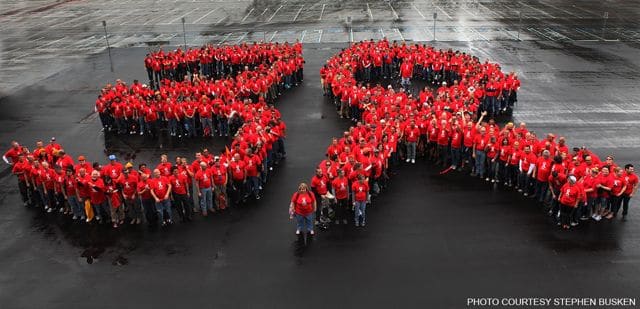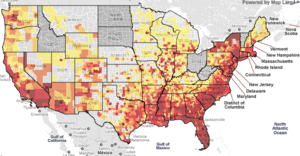
It was thirty years ago today, on June 5, 1981, that the Center for Disease Control first published a report on the mysterious epidemic that we have now come to know as AIDS. Today, we remember the 30 million who have passed from the disease and and the 32 million who currently live with either AIDS or HIV. You can read the original 1981 CDC report on the disease on the agency's on-line archive here. Other relevant reports about its can be found here.
To mark the anniversary, hundreds of people are expected to participate in a candlelight vigil in West Hollywood at 6pm tonight. Details about the march are here.
The White House has issued a statement, which reads in part:
 “This battle is not over,” said Secretary for Health and Human Services Kathleen Sebelius. “As long as the AIDS virus threatens the health and lives of people here and around the globe, our work will continue to connect people to treatment, educate them about how to protect themselves, battle discrimination, and to keep the country focused on our collective fight against this pandemic.” While America has made great strides in the fight against HIV/AIDS in recent years, the Obama Administration has made it a priority to re-focus national attention on a domestic epidemic that is still in play. Building on a growing body of evidence and lessons learned, the Administration released last year and is now implementing a comprehensive National HIV/AIDS Strategy that provides a roadmap for reducing new infections, improving care and health outcomes for people living with HIV/AIDS, and reducing the health disparities that have characterized this epidemic."
“This battle is not over,” said Secretary for Health and Human Services Kathleen Sebelius. “As long as the AIDS virus threatens the health and lives of people here and around the globe, our work will continue to connect people to treatment, educate them about how to protect themselves, battle discrimination, and to keep the country focused on our collective fight against this pandemic.” While America has made great strides in the fight against HIV/AIDS in recent years, the Obama Administration has made it a priority to re-focus national attention on a domestic epidemic that is still in play. Building on a growing body of evidence and lessons learned, the Administration released last year and is now implementing a comprehensive National HIV/AIDS Strategy that provides a roadmap for reducing new infections, improving care and health outcomes for people living with HIV/AIDS, and reducing the health disparities that have characterized this epidemic."
"The President is also deeply committed to expanding access to HIV/AIDS prevention and care for more Americans and to supporting a robust research agenda to ensure that we make steady progress toward ending the pandemic. Under the President's leadership, the Administration has increased domestic HIV/AIDS funding to support the Ryan White HIV/AIDS Program and HIV prevention. On the global stage, the Obama Administration's Global Health Initiative has built on the President's Emergency Plan for AIDS Relief (PEPFAR) by expanding access to treatment, prevention and care for those in need around the world, and further enhanced our impact by providing increased support for maternal-child health and by supporting the efforts of governments and communities in the developing world to build their capacity to fight this epidemic and meet the other health challenges they face. The Administration will continue to use its leadership to call upon other countries to honor their commitments to defeat a pandemic that demands the attention of the entire world."
The Chicago Sun-Times spotlights Tom Menard, the 52-year-old vice president of operations for the AIDS Foundation of Chicago who has been living with HIV for almost 30 years. The New York Times has also published an editorial by Mark Trautwein, an editor for KQED Public Radio who has also lived with the virus for the same amount of time.
You may recall that, just last month, Timothy Ray Brown, the so-called "Berlin Patient" was apparently "cured" of HIV through the use of genetically-engineered stem cells. Watch a CBS2 SF television interview with Brown, AFTER THE JUMP.
Researchers are currently focused on finding a vaccine.
 Click here for a map from Emory University that shows where the highest concentration of people living with HIV are located in the United States.
Click here for a map from Emory University that shows where the highest concentration of people living with HIV are located in the United States.
The Kaiser Family Foundation has created an informative interactive time-line on the disease, which you can view here.
The National Museum of American History marks the anniversary with a newly opened exhibition on the disease.
Last month the San Francisco AIDS Foundation recently installed a giant AIDS ribbon on Twin Peaks in San Francisco.
The San Francisco AIDS Foundation has produced a compelling video about the effects of AIDS and HIV on the city of San Francisco, one of the hardest hit regions during the early history of the disease. Watch it, AFTER THE JUMP.
Human AIDS Red Ribbon photo above courtesy of Stephen Busken for AIDS Life Cycle 10.





